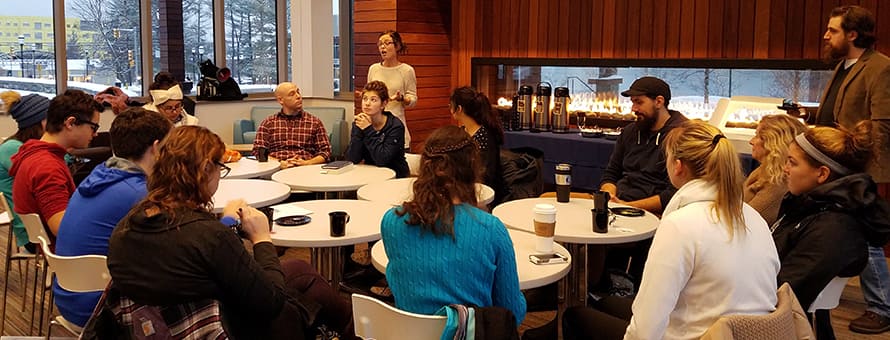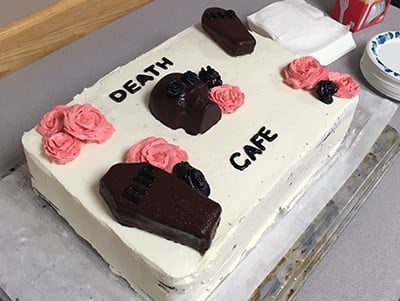Death Cafe at SNHU

About a year ago, I organized and hosted the first Death Café at Southern New Hampshire University. A Death Café is an opportunity for people who don't know each other to come together - typically in a public place, such as a library or a university-to eat cake, drink tea and talk about death.
I read about the Death Café movement in 2016 and immediately got excited. Not only are eating cake, drinking tea and talking about death three of my favorite things to do, but I was in the middle of teaching "Death and the Meaning of Life," a philosophy course I had developed in 2014. The enthusiasm of my students for talking about death made me think that a campus-wide Death Café would be worth a try. I proceeded to organize one in February of 2017, and it was so popular that I have continued to organize two per semester ever since. Each of these events has attracted 15-40 people, comprising a mix of students, faculty, staff and even some members of the local community. The feedback from these events has been overwhelmingly positive, and the most common question I get as I walk around campus is, "When is the next Death Café?"

The first Death Café was held by Jon Underwood, at his house in England, in 2011, and since then it has grown into a global movement (over 5,000 Death Cafés have been hosted in over fifty countries). Anyone can host a Death Café as long as they adhere to some simple guidelines, the most important of which is not having an agenda. Death Cafés are participant driven, which means that the conversation goes wherever the attendees want it to go. The discussion can range from the experience of losing loved ones to the fear of dying, from the ethics of euthanasia to personal beliefs about life after death. The only expectations are common civility and that the conversation be, in some way, about death.
Why are Death Cafés so popular both at SNHU and in the world at large? And relatedly, but more importantly, why are they worth doing?
- First, people have a deep desire to have "real" conversations about things that actually matter. Few things make more of a difference to the human experience than death, and making it the explicit topic of conversation invariably leads to authentic conversations and connections with other people. Talking about death also leads easily to discussions of other things that matter, such as love, relationships and values
- Second, Death Cafés bring together people from different generations, roles and religious backgrounds and enable them to have thoughtful conversations with each other. Not only is this rare in our increasingly polarized culture, but it shows that what we all share in common (e.g., our mortality and the loss of loved ones) is far greater than what sets us apart.
- Third, thinking about death reminds us of how short, uncertain and precious life really is, and thoughts like these can inspire us to better appreciate our lives and to think more carefully about what really matters. Given how short and fragile our lives are, are we doing the things that are really worth doing? Every Death Café is an opportunity to think more deeply about life and what we can do to make the most of it.
In spite of the many virtues of talking about it, death remains a taboo subject in our death-denying culture. Bringing it up is considered weird or inappropriate, and the person who does so is seen as being morbid or depressing. Normally, we talk about death only when someone has just died or been diagnosed with a serious illness. However, as the only certainty in life, death should be something we talk about more often, and Death Cafés provide one very good opportunity for us to do so.
Dr. Kiki Berk is an assistant professor of philosophy at Southern New Hampshire University and currently holds the Papoutsy Chair in Ethics. She received her Ph.D. in Philosophy from the VU University Amsterdam in 2010. Her current research interests include value theory (especially happiness), analytic existentialism (especially the meaning of life), and the philosophy of death.
Explore more content like this article

15 Years Later: A Surprise Reunion for Two Grads at Commencement

How Celebrating Small Wins Can Make a Big Difference

Heart, Hope and Some Help Along the Way: SNHU’s Fall Class of 2025
About Southern New Hampshire University

SNHU is a nonprofit, accredited university with a mission to make high-quality education more accessible and affordable for everyone.
Founded in 1932, and online since 1995, we’ve helped countless students reach their goals with flexible, career-focused programs. Our 300-acre campus in Manchester, NH is home to over 3,000 students, and we serve over 135,000 students online. Visit our about SNHU page to learn more about our mission, accreditations, leadership team, national recognitions and awards.

